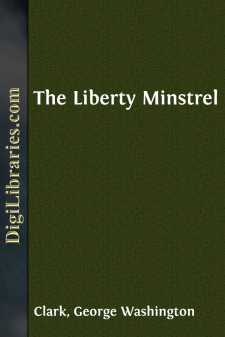Categories
- Antiques & Collectibles 13
- Architecture 36
- Art 48
- Bibles 22
- Biography & Autobiography 813
- Body, Mind & Spirit 142
- Business & Economics 28
- Children's Books 17
- Children's Fiction 14
- Computers 4
- Cooking 94
- Crafts & Hobbies 4
- Drama 346
- Education 46
- Family & Relationships 57
- Fiction 11829
- Games 19
- Gardening 17
- Health & Fitness 34
- History 1377
- House & Home 1
- Humor 147
- Juvenile Fiction 1873
- Juvenile Nonfiction 202
- Language Arts & Disciplines 88
- Law 16
- Literary Collections 686
- Literary Criticism 179
- Mathematics 13
- Medical 41
- Music 40
- Nature 179
- Non-Classifiable 1768
- Performing Arts 7
- Periodicals 1453
- Philosophy 64
- Photography 2
- Poetry 896
- Political Science 203
- Psychology 42
- Reference 154
- Religion 513
- Science 126
- Self-Help 84
- Social Science 81
- Sports & Recreation 34
- Study Aids 3
- Technology & Engineering 59
- Transportation 23
- Travel 463
- True Crime 29
The Liberty Minstrel
Categories:
Description:
Excerpt
PREFACE.
All creation is musical—all nature speaks the language of song.
'There's music in the sighing of a reed,
There's music in the gushing of a rill;
There's music in all things, if man had ears;
The earth is but an echo of the spheres.'
And who is not moved by music? "Who ever despises music," says Martin Luther, "I am displeased with him."
'There is a charm—a power that sways the breast,
Bids every passion revel, or be still;
Inspires with rage, or all our cares dissolves;
Can soothe destruction, and almost soothes despair.'
That music is capable of accomplishing vast good, and that it is a source of the most elevated and refined enjoyment when rightly cultivated and practiced, no one who understands its power or has observed its effects, will for a moment deny.
'Thou, O music! canst assuage the pain and heal the wound
That hath defied the skill of sager comforters;
Thou dost restrain each wild emotion,
Thou dost the rage of fiercest passions chill,
Or lightest up the flames of holy fire,
As through the soul thy strains harmonious thrill.'
Who does not desire to see the day when music in this country, cultivated and practised by all—music of a chaste, refined and elevated style, shall go forth with its angel voice, like a spirit of love upon the wind, exerting upon all classes of society a rich and healthful moral influence. When its wonderful power shall be made to subserve every righteous cause—to aid every humane effort for the promotion of man's social, civil and religious well-being.
It has been observed by travellers, that after a short residence in almost any of the cities of the eastern world, one would fancy "every second person a musician." During the night, the streets of these cities, particularly Rome, the capitol of Italy, are filled with all sorts of minstrelsy, and the ear is agreeably greeted with a perpetual confluence of sweet sounds. A Scotch traveller, in passing through one of the most delightful villas of Rome, overheard a stonemason chanting something in a strain of peculiar melancholy; and on inquiry, ascertained it to be the "Lament of Tasso." He soon learned that this celebrated piece was familiar to all the common people. Torquato Tasso was an Italian poet of great merit, who was for many years deprived of liberty, and subjected to severe trials and misfortunes by the jealousy and cruelty of his patron, the Duke of Ferrara. That master-piece of music, so justly admired and so much sung by the high and low throughout all Italy, had its origin in the wrongs of Tasso. An ardent love of humanity—a deep consciousness of the injustice of slavery—a heart full of sympathy for the oppressed, and a due appreciation of the blessings of freedom, has given birth to the poetry comprising this volume. I have long desired to see these sentiments of love, of sympathy, of justice and humanity, so beautifully expressed in poetic measure, embalmed in sweet music; so that all the people—the rich, the poor, the young, and the old, who have hearts to feel, and tongues to move, may sing of the wrongs of slavery, and the blessings of liberty, until every human being shall recognise in his fellow an equal;—"a man and a brother." Until by familiarity with these sentiments, and their influence upon their hearts, the people, whose duty it is, shall "undo the heavy burdens and let the oppressed go free."
I announced, sometime since, my intention of publishing such a work....


